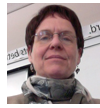The Challenge of Implementing a Reporting of Current Events in a High School Chemistry Class
From Reen Gibb
 I have implemented the reporting of current events in my honors chemistry 1 classes. Twice a month I have students report on a current event to do with the topic of water or energy -- themes I thread throughout the year as we cover the topics required by the chemistry SAT 2 curriculum. The article has to be from a reputable source and students have to write a summary paragraph that they submit for grading. I ask for volunteers or I pick a student to present his/her topic to the class. Excellent questions are raised, other students chime in with what they know or have questions on. This new routine has improved students’ written and oral communication skills and the ability to ask good questions. You can feel the energy and enthusiasm in the room as students raise questions and share what they know about the topic being presented. I have implemented the reporting of current events in my honors chemistry 1 classes. Twice a month I have students report on a current event to do with the topic of water or energy -- themes I thread throughout the year as we cover the topics required by the chemistry SAT 2 curriculum. The article has to be from a reputable source and students have to write a summary paragraph that they submit for grading. I ask for volunteers or I pick a student to present his/her topic to the class. Excellent questions are raised, other students chime in with what they know or have questions on. This new routine has improved students’ written and oral communication skills and the ability to ask good questions. You can feel the energy and enthusiasm in the room as students raise questions and share what they know about the topic being presented.
The huge issue is time. We do not have enough. Students have questions on content from their textbook (pace set by SAT 2 curriculum), weekly lab time and now sharing current events. There is a real disconnect between what we say we want kids to do in our science classes and the way the students (and teachers) are assessed. The national exams (SAT II, AP..) rely heavily on knowing facts, especially for first year science courses. Students, parents, teachers and administrators carefully examine student scores. One loses class time for Q/A sessions on homework when one takes time out for current events, more open-ended lab investigations and discussions into topics the students are enthused about. At the end of the day, students still have to perform on very factually oriented tests. This is a constant challenge for me. I want my kids to love science, think and question what they are learning, DO science in class and enter STEM fields in their future. The breadth of knowledge (memorization) that is expected in science classes—so kids test well—comes at the expense of depth and of nurturing curiosity.
Reen Gibb is a Chemistry Teacher at Westwood High School in Westwood, Massachusetts. She also works at MIT to train students who will become high school science teachers.
Back to newsletter |